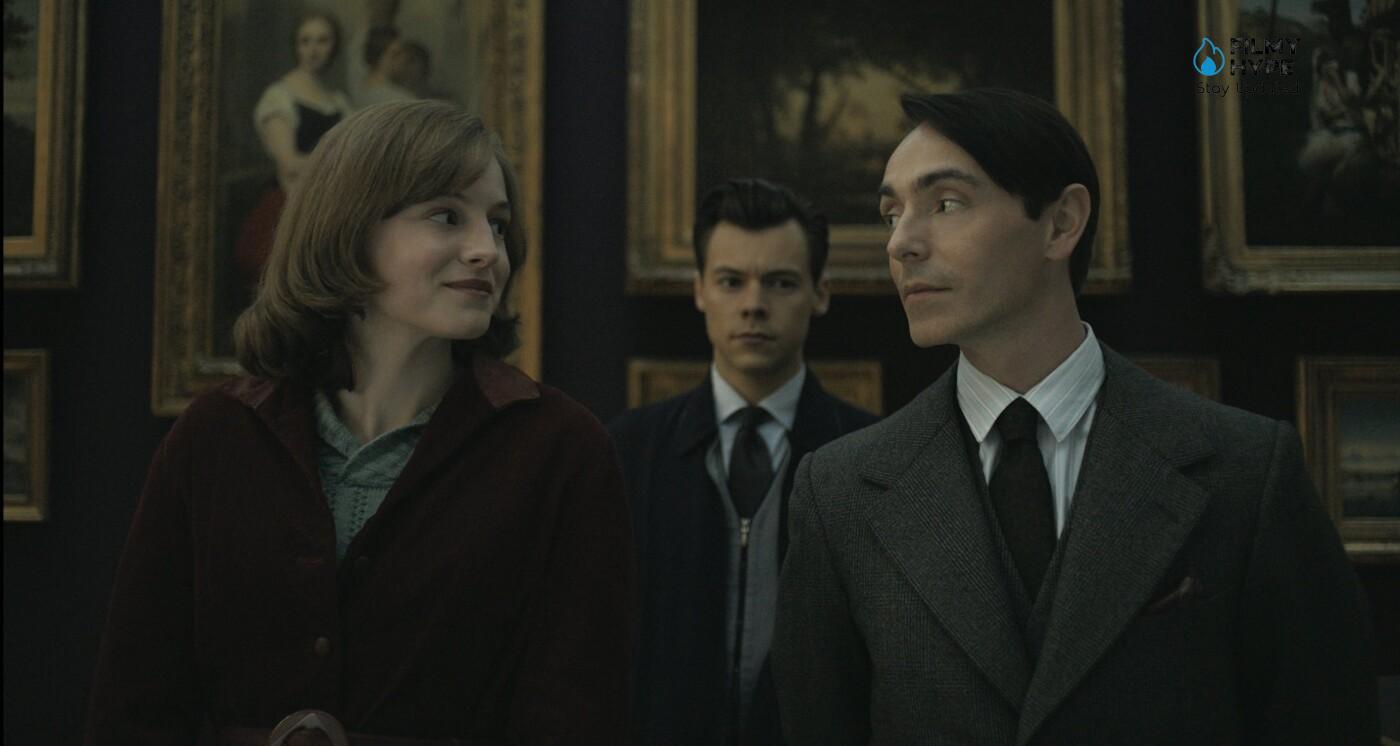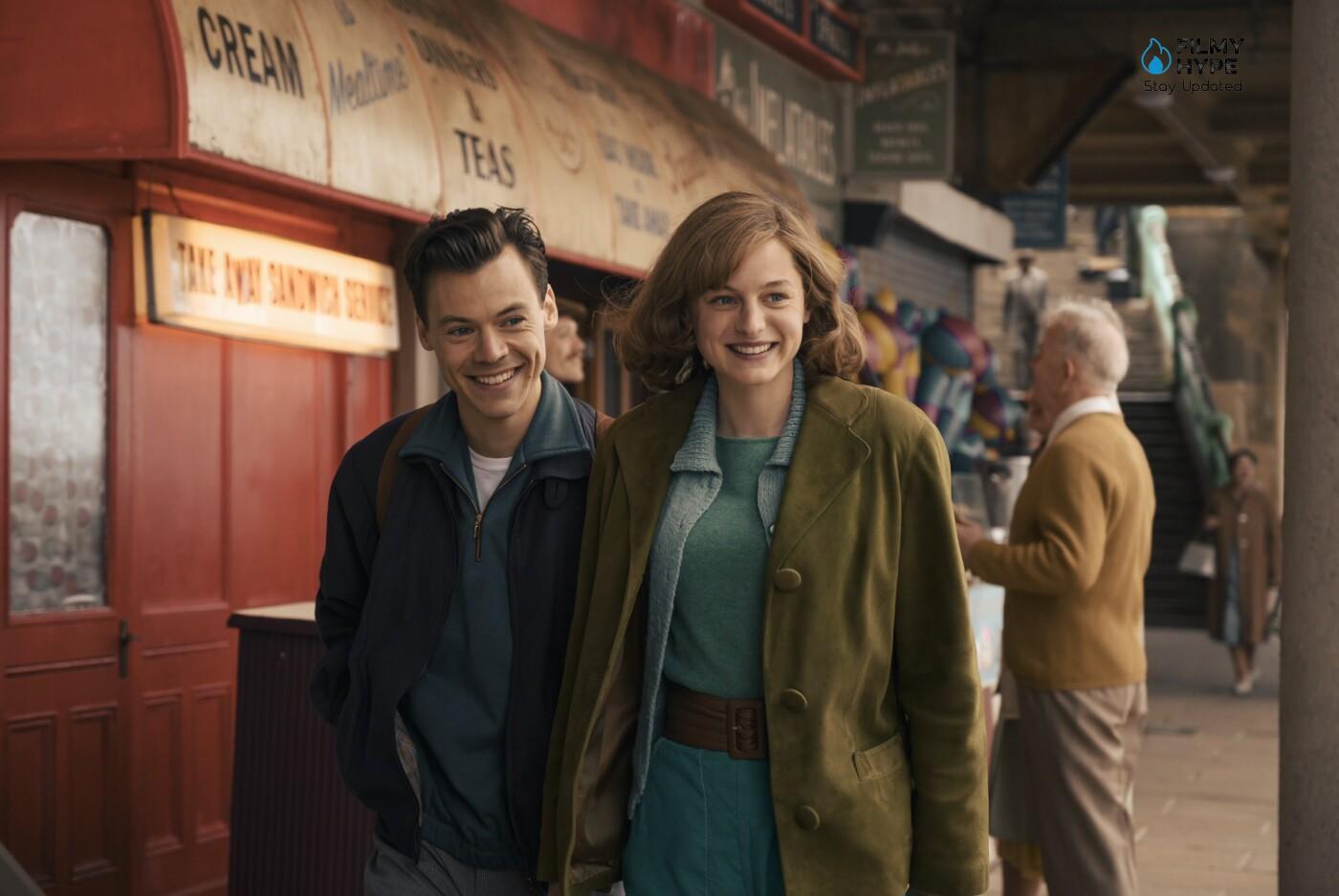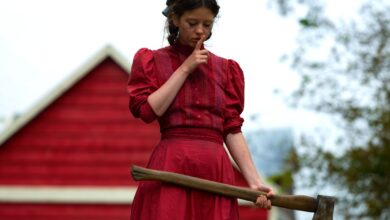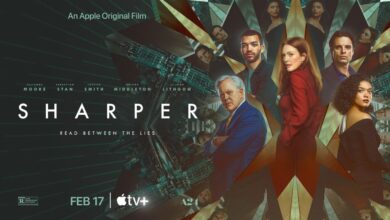My Policeman Review: Harry Styles In A (NOT SO) Tormented Love Affair Read Full Review
Cast: Harry Styles, David Dawson, Emma Corrin, Linus Roache, Rupert Everett, Gina McKee
Director: Michael Grandage
Streaming Platform: Amazon Prime Video
Filmyhype.com Ratings: 3/5 (three stars)
The long-awaited My Policeman, starring Harry Styles, Emma Corrin and David Dawson, is now available on Prime Video. This story of intertwined relationships and secrecy is taken from Bethan Roberts’ novel of the same name, set in 1950s Britain, with time-hopping back to 1998. In our review of My Policeman, we will see how the film struggled to adapt a novel. whose watchwords are moderation and reserve but which, at the same time, are impregnated with emotional tension, getting lost in the search for a misplaced staging, which deprives the narration of the ardor necessary to sympathize with the different psychologies of the protagonists.

For Harry Styles, 2022 could be the year in which to understand whether he wants to continue in the cinema or not. After having seen if Don’t Worry Darling is a good movie, but above all examined all the controversies that it has brought with it from the beginning of the singer’s relationship with the director Olivia Wilde until the alleged (not) spit at the film premiere to Chris Pine, the psychological thriller with co-star Florence Pugh certainly didn’t put him in the best light. A spotlight aimed and waited for him at the gate, not knowing, however, that his colleague would (as expected) easily crush him. A Pugh who is one of the already established divinities of the contemporary Pantheon of acting, for a film that has also not failed to turn up one’s nose and to be influenced by the gossip part carried that she has raised.
My Policeman Review: The Story Plot
When cop Tom (Harry Styles) offers to teach her to swim, young teacher Marion (Emma Corrin) falls in love with her. Even when she sports anything, but decent etiquette and her grammar aren’t the best, she thinks he’s perfect. In addition, Tom begins to take an interest in art and music – the passions of the sweet Marion, whom he initially distanced himself from – as the couple begins to spend more and more time with local museum curator Patrick (David Dawson). At one point, Tom even asks her to marry him, even though she has long since started a secret relationship with Patrick. But a gay cop in 1950s Brighton obviously can’t have an easy time and a marriage of convenience is the only option. Forty years later, Marion (Gina McKee) welcomes into her home Patrick (Rupert Everett), stricken with a serious illness and barely able to speak.
Tom (Linus Roache), with whom she is still married, however, refuses to meet the guest: he is convinced that Marion saved Patrick from a retirement home only to be able to take revenge on him. My Policeman is nothing more than the love affair between two men in their late fifties who, to mask their feelings, have to hide behind the fiction of daily life that leads the character of Tom (Styles) to marry the too-permissive Marion (Emma Corrrin). A marriage punctuated by the constant presence of the director of the local museum Patrick (David Dawson), who will have to learn to share with the woman the man she loves, trying to keep her appearance intact.
A conventional narrative, as the transposition and staging of a tragic tale, seems to soften too much the dramatic trait of its content, making it opaque and excessively soft. An operation in which nothing manages to stand out due to the haze of Ben Davis’ photography and the pale and not very decisive direction of Michael Grandage. A delicacy in the technique that would like to return the tenderness of emotions that know how to ignite with passion but must also remain unspoken to maintain their security. What is excessive in wanting to re-propose what should be a troubling story and that so he would have expected to be transmitted to the viewer as well?
My Policeman Review and Analysis
With this invoice, instead, My Policeman gets lost in the gallery of many other cinematic relationships that have had to hide the secret of their union due to bigotry and the backwardness of the times. A film that therefore remains trapped in its anonymity, looking for flashes in the erotic and romantic moments in which the characters of Tom and Patrick try to launch themselves, soon cooled once again by the canonicity of work as many can be. A surface from which not even the rehearsals of the actors can free themselves, and that if they saw the actor’s version of Harry Styles in Don’t Worry Darling undertone, in My Policeman they only allow us to intuit a potential that is never really expressed.
A sweetness that is that “innocence mixed with a certain curiosity” from which the character of fellow David Dawson was attracted, fairly more fascinating than the performances of his companions, but also limited to tones that are too used in this type of film. A work that returns only a hint of the human torment of the trio, like the unstable balance on which the story of the characters is based. A love that has only waited for the moment to be free, which is not even granted by the film itself. My Policeman is the story of forbidden love, the passing of time and missed opportunities. A story of love and self-discovery through a triple point of view, hampered by the social repression of England in the 1950s and by the terrible consequences that an illicit relationship could have for the existence of three people linked by a common bond.

Michael Grandage, from a screenplay by Ron Nyswaner (nominated for an Oscar for “Philadelphia”), tackles the story of Tom, Marion and Patrick unfortunately without being able to replicate on screen the suggestive delicacy of Roberts’ novel; his characters are embedded in the nostalgic veil of an idealized era, under whose facade the repressed pain that seeks an outlet should pulsate. A screenplay that does not keep pace with the precious message of awareness that the film would like to make use of is perhaps the greatest flaw of My Policeman, relegated to a socio-cultural framework exploited more for its vintage atmosphere than for its capacity. effective to make us understand how certain struggles of the past persist in the present.
In his third feature film, theatre director Michael Grandage relies entirely on the charisma of his protagonist Harry Styles, playing with the iconography of the One Direction superstar and trying to deliver a melodrama that is highly dramatic and deeply tragic only on paper. For the rest, the four-decade representation of an epochal love triangle between a woman, her husband and his lover is so decorous and historicized that the desire for such a passionate love reaches the audience in a muted way, devoid of conflict. and of the erotic charge that such a relational dynamic should bring with it.
In addition, the production does not contribute to further fueling the fire that burns at low flame. As in his delightful biopic about the eccentric and monumental literary character Thomas Wolfe, 2016’s “Genius,” Michael Grandage once again relies more on good-looking sets and costumes than on passionate dramaturgy. As an example of this, we could cite the fact that Patrick is brutally beaten twice in the course of the film, but the director never gives up the musical notes of a piano that continues to play even during the violence, trying to embed the story in a ‘ high-sounding atmosphere, which imprisons the emotions of its protagonists in the impeccable dialectic of an all-British theatre drama.
The flavour of the passion that should characterize the story of My Policeman is missing, the emotional impetus that should direct not only the unfolding of events but also the dialogues and characterizations of its characters. We are always in the limbo of a restrained emotionality, which fails to be justified as a reflection of the period and the very nature of history, in which discretion and prudence play an essential role. Actorial services are also problematic, not so much if considered individually but in their limited synergy; among the three, Emma Corrin is the one that stands out the most, managing to dissect a greater psychological complexity than her male counterparts. Dawson manages to embroider Patrick’s enigmatic and sophisticated personality but not as well the tragic pain of the inner conflict that grips him when he tries to live his sexuality more openly than Tom.
Finally, Harry Styles, while certainly better direct than in Olivia Wilde’s Don’t Worry Darling, clearly struggles to keep up with two old-fashioned colleagues. Ultimately, My Policeman is an elegant but arid film, an exercise in melancholy which, despite its apparent charm, is lost in the pomposity of solemn melodrama, never really dissecting the character complexities of its protagonists and settling for the setting of an atmospheric film. rather than seeking an accomplished meaning.
My Policeman Review: The Last Words
My Policeman is a film that should tell about the torment of hidden love and of a woman who allowed her life to be a lie. The work, on the other hand, fails to express this tragic passion, choosing tones that greatly soften the outcome of the story, making it conventional and similar to many other stories already seen on the screen. A trio of actors in part, but who are unable to express themselves at their best, looking for a combination of charm, sweetness and sentiment that is not always expressed to the fullest potential. My Policeman takes on the colours of a theatrical drama and then gets lost in a visual refinement that hinders the ardour of the protagonists’ souls. There remains the nostalgia of a time that was and of a story that has lost the opportunity to express its validity even in the present.






